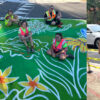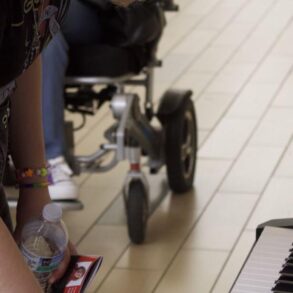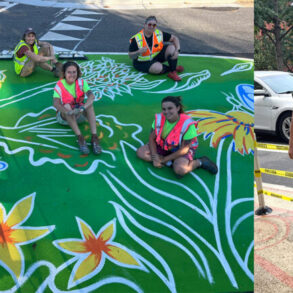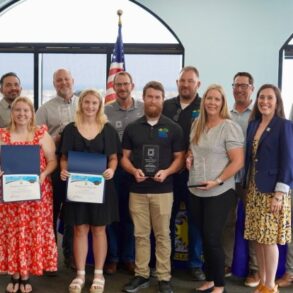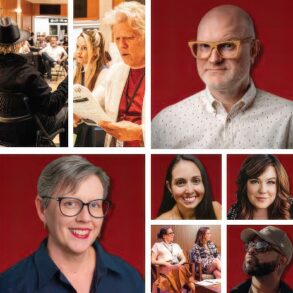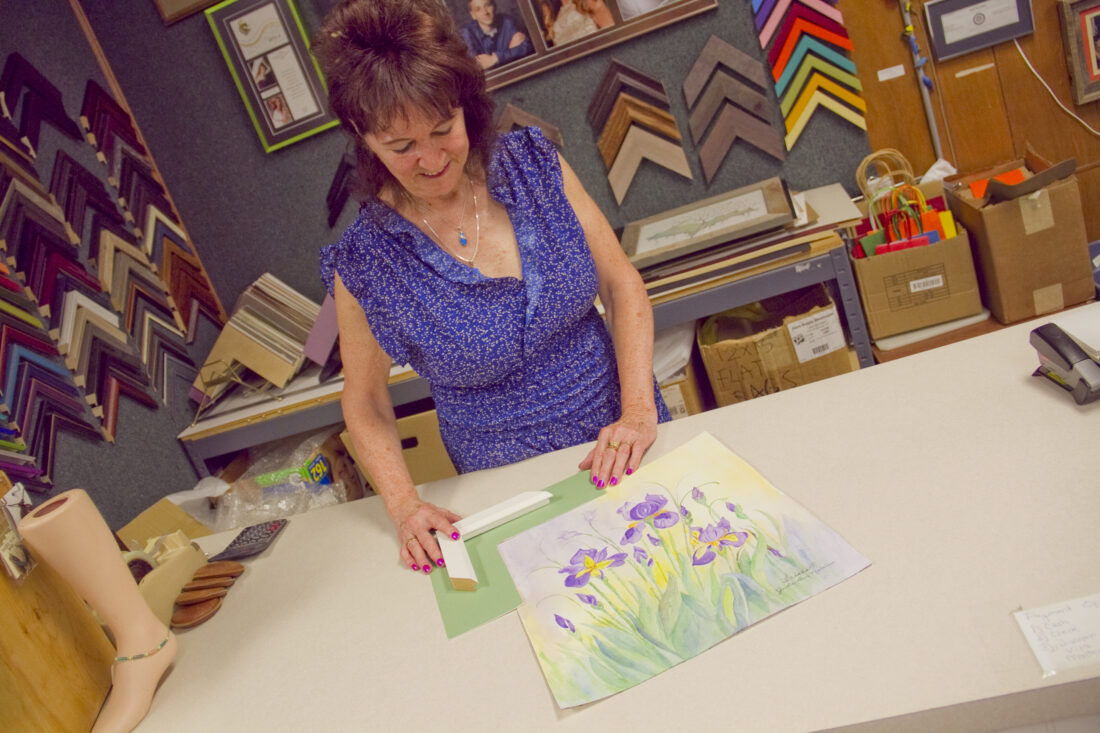
R. R. Branstrom | Daily Press
At the Frame Farm and Art Gallery in Gladstone, owner Debbie Chase lays out mat and frame samples chosen by a customer to suit their artwork.
EDITOR NOTE: The Daily Press will be featuring a series of articles on local businesses, highlighting their history and what makes them unique. The series will run on a regular basis in the Daily Press.
— — —
GLADSTONE — The Frame Farm and Art Gallery is a Delta Avenue business that originated to fill a specific void that was affecting the career of one local painter. The store took off running and has been going strong since the early 1980s, but now, its founder is considering retirement.
The late Betty DeBacker was an artist from Watson, Mich. Along what is now County Road 426, the tiny community was one of a number of settlements that developed along the railroad tracks that cut through the deep woods of the central Upper Peninsula.
DeBacker, whose oil paintings of natural landscapes and identifiable sites dot some walls in homes and businesses around the area and likely farther away, was having trouble finding frames for her work when her daughter set about solving the problem. In 1982, Debra (“Debbie”) Chase — DeBacker’s daughter — and her friend, Kathy Paul, opened the Frame Farm and Art Gallery on the 800 block of Delta Avenue in downtown Gladstone.
From the get-go, Chase and Paul purchased custom framing materials from Larson-Juhl, still in business with the Frame Farm and Art Gallery today, and travelled to find ready-made frames. They drove the nearly 700-mile round trip to buy product from Chicago to bring to the Upper Peninsula regularly — about every two to three months, Chase said.
Both Chase and Paul were educators at Mid Peninsula School. While they worked their day jobs, DeBacker kept up the Frame Farm, and the teachers returned to work at the shop in the evenings.
“We started small and kept adding inventory,” said Chase.
The business grew quickly — barely a year after opening, the store relocated to 920 Delta Ave., where it remains today. Prior to becoming the Frame Farm and Art Gallery, this location housed Royer Home Furnishings.
“We added selling t-shirts, school jackets and caps with screen printing and hot lettering,” Chase said. “Business was good.”
In 1984, following a layoff from the school, Chase took a “plunge” and bought out Paul’s share of the business in addition to purchasing the building from Eugene Royer.
It wasn’t long before Chase was called back to her teaching job full-time and she and her husband, Derby, bought a convenience store in Soo Hill.
“By that time, we had phased out the t-shirts and started selling gift items that fit the U.P. lifestyle, even though the main part of the business has always been picture framing,” said Chase, adding that today, framing remains 80% of the store’s traffic.
During the time when Chase was busy with teaching, coaching, and the convenience store, DeBacker took over the Frame Farm and Art Gallery and ran it on her own until Chase retired from Mid Pen in 2005. DeBacker’s own paintings were sold in-store and at art shows.
“The customers loved my mom, and she loved working in the store,” Chase said.
DeBacker passed away in 2011. Still, her impacts live on — not only in memory, but also immortalized in countless brush-stroked canvases.
Having continued running the operation solo for many years now, Chase explained that the framing business was challenging but interesting and rewarding.
“In preparing to be a professional picture framer, it meant going to clinics and workshops to learn how to protect and enhance artwork,” she said. “This involves knowing what glass to use, how to cut mats, mount work, stretch canvas, needlepoint, diamond art, posters, photography, watercolor, shadow boxes … it’s always a learning process.”
As with other industries, trends come and go. Chase said that needlepoint used to be very popular; lately, she’s been framing more diamond art — a type of mosaic craft made from colored rhinestones that, when applied, act like pixels making up a finished image.
In the back half of the shop, items to be framed wait on a table, while those recently done rest against shelves of other materials. Chase has recently completed some unique pieces — there’s a round jigsaw puzzle on a red suede mount and a Green Bay Packers jersey artfully folded behind glass.
“The greatest part of framing artwork, family heirlooms, etc. is that between the customer’s vision and some creativity, the finished product is so rewarding. Most customers are so grateful and easy to work with,” she said.
After this much time, though, Chase is thinking about exploring other avenues and said she might look to sell the business by the end of the year or next year. While it’s been a fun journey for her, she’s hoping to see what else life has to offer, and has been letting her customers know of her eventual plan.
Some of those are regulars who come from around a 60-mile radius; others are former locals who bring unframed art to her when they return to the area to visit.
“My hope would be that there’s someone out there who would like to continue this. If not, I’ll liquidate the inventory and sell the building,” she said.
“It’s been a great adventure, because every day is a little different. You’re not doing the same thing every day; you’re framing different products, you’re creating a new image for somebody,” Chase said, smiling, surrounded by both finished works and frames ready to be filled.
This post was originally published on this site be sure to check out more of their content


